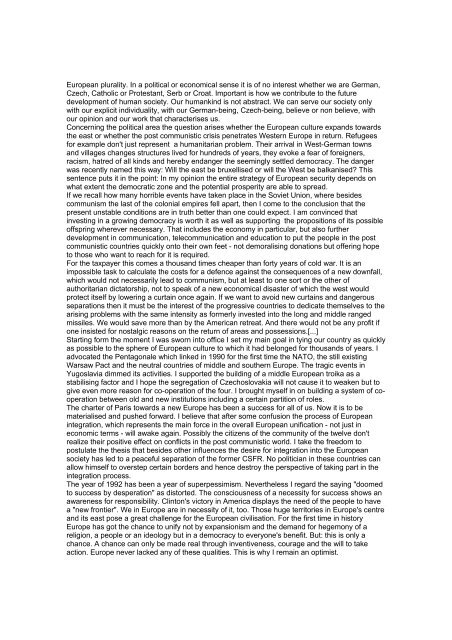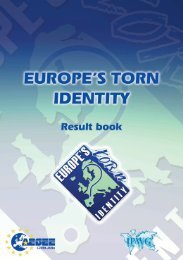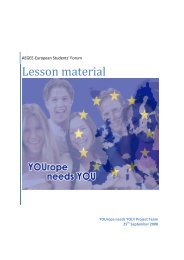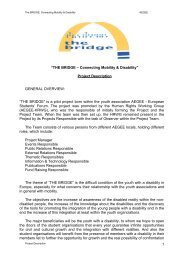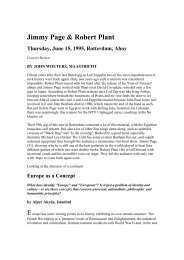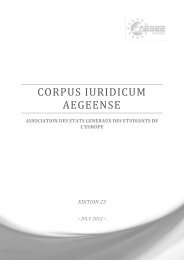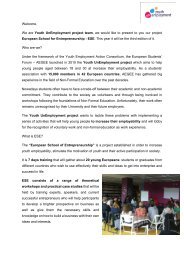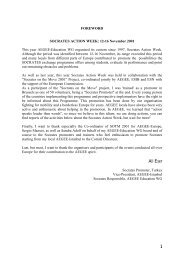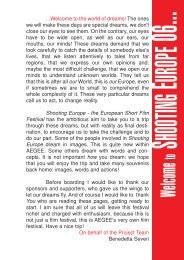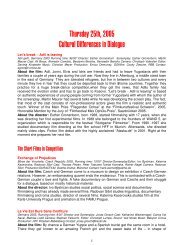OneEurope 1/93 East-West Magazine HOW TO BUILD THE ...
OneEurope 1/93 East-West Magazine HOW TO BUILD THE ...
OneEurope 1/93 East-West Magazine HOW TO BUILD THE ...
Create successful ePaper yourself
Turn your PDF publications into a flip-book with our unique Google optimized e-Paper software.
European plurality. In a political or economical sense it is of no interest whether we are German,<br />
Czech, Catholic or Protestant, Serb or Croat. Important is how we contribute to the future<br />
development of human society. Our humankind is not abstract. We can serve our society only<br />
with our explicit individuality, with our German-being, Czech-being, believe or non believe, with<br />
our opinion and our work that characterises us.<br />
Concerning the political area the question arises whether the European culture expands towards<br />
the east or whether the post communistic crisis penetrates <strong>West</strong>ern Europe in return. Refugees<br />
for example don't just represent a humanitarian problem. Their arrival in <strong>West</strong>-German towns<br />
and villages changes structures lived for hundreds of years, they evoke a fear of foreigners,<br />
racism, hatred of all kinds and hereby endanger the seemingly settled democracy. The danger<br />
was recently named this way: Will the east be bruxellised or will the <strong>West</strong> be balkanised? This<br />
sentence puts it in the point: In my opinion the entire strategy of European security depends on<br />
what extent the democratic zone and the potential prosperity are able to spread.<br />
If we recall how many horrible events have taken place in the Soviet Union, where besides<br />
communism the last of the colonial empires fell apart, then I come to the conclusion that the<br />
present unstable conditions are in truth better than one could expect. I am convinced that<br />
investing in a growing democracy is worth it as well as supporting the propositions of its possible<br />
offspring wherever necessary. That includes the economy in particular, but also further<br />
development in communication, telecommunication and education to put the people in the post<br />
communistic countries quickly onto their own feet - not demoralising donations but offering hope<br />
to those who want to reach for it is required.<br />
For the taxpayer this comes a thousand times cheaper than forty years of cold war. It is an<br />
impossible task to calculate the costs for a defence against the consequences of a new downfall,<br />
which would not necessarily lead to communism, but at least to one sort or the other of<br />
authoritarian dictatorship, not to speak of a new economical disaster of which the west would<br />
protect itself by lowering a curtain once again. If we want to avoid new curtains and dangerous<br />
separations then it must be the interest of the progressive countries to dedicate themselves to the<br />
arising problems with the same intensity as formerly invested into the long and middle ranged<br />
missiles. We would save more than by the American retreat. And there would not be any profit if<br />
one insisted for nostalgic reasons on the return of areas and possessions.[...]<br />
Starting form the moment I was sworn into office I set my main goal in tying our country as quickly<br />
as possible to the sphere of European culture to which it had belonged for thousands of years. I<br />
advocated the Pentagonale which linked in 1990 for the first time the NA<strong>TO</strong>, the still existing<br />
Warsaw Pact and the neutral countries of middle and southern Europe. The tragic events in<br />
Yugoslavia dimmed its activities. I supported the building of a middle European troika as a<br />
stabilising factor and I hope the segregation of Czechoslovakia will not cause it to weaken but to<br />
give even more reason for co-operation of the four. I brought myself in on building a system of cooperation<br />
between old and new institutions including a certain partition of roles.<br />
The charter of Paris towards a new Europe has been a success for all of us. Now it is to be<br />
materialised and pushed forward. I believe that after some confusion the process of European<br />
integration, which represents the main force in the overall European unification - not just in<br />
economic terms - will awake again. Possibly the citizens of the community of the twelve don't<br />
realize their positive effect on conflicts in the post communistic world. I take the freedom to<br />
postulate the thesis that besides other influences the desire for integration into the European<br />
society has led to a peaceful separation of the former CSFR. No politician in these countries can<br />
allow himself to overstep certain borders and hence destroy the perspective of taking part in the<br />
integration process.<br />
The year of 1992 has been a year of superpessimism. Nevertheless I regard the saying "doomed<br />
to success by desperation" as distorted. The consciousness of a necessity for success shows an<br />
awareness for responsibility. Clinton's victory in America displays the need of the people to have<br />
a "new frontier". We in Europe are in necessity of it, too. Those huge territories in Europe's centre<br />
and its east pose a great challenge for the European civilisation. For the first time in history<br />
Europe has got the chance to unify not by expansionism and the demand for hegemony of a<br />
religion, a people or an ideology but in a democracy to everyone's benefit. But: this is only a<br />
chance. A chance can only be made real through inventiveness, courage and the will to take<br />
action. Europe never lacked any of these qualities. This is why I remain an optimist.


